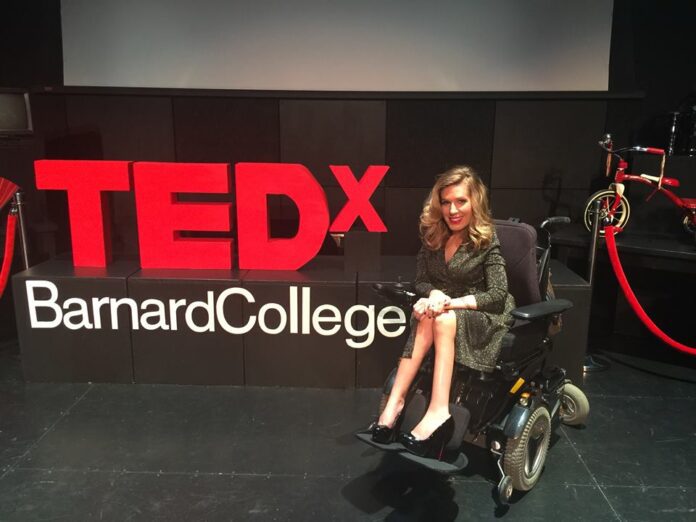Pennsylvania native Dr. Danielle Sheypuk says she’s always believed she was meant to do something big. And that she has ─ big and, more precisely, bold! She earned a Ph.D. in psychology from the New School of Social Research in Manhattan and, organically, embraced a specialty inspired by her disability. Born with spinal muscular atrophy type II, a genetic disorder affecting control of muscle movement, Dr. Sheypuk focuses on dating, relationships, intimacy and sexuality, particularly among people with disabilities.
Not long ago, talking about sexuality in relation to the disabled was taboo, says Dr. Sheypuk. “My family never talked to me about dating or sex, whereas they would casually talk to my younger sister about dating or cute boys. And family friends would fix her up, but not me,” Dr. Sheypuk recalls. “I felt excluded, like I didn’t belong in the world of dating and romance because I’m in a wheelchair and, so, not desirable in that way.” But deep down she knew otherwise and, ultimately, proclaimed the contrary. “We have the same drives, needs and desires as anyone else. Although, people assume that if you have a disability, you are asexual or too sick to have sex.”
By addressing such inaccurate assumptions, Dr. Sheypuk earned the label of “sexpert.” “I enjoy the edginess of the title. It’s attention-grabbing,” she says and, thus, opens the door to broader conversations about people of all abilities being sexy, datable and lovable.
In 2012, Dr. Sheypuk launched her private practice with Skype-led sessions, an expanding concept known as telepsychology. The approach greatly increases accessibility for all clients, but especially so for those with disabilities. And while she treats patients who do not identify as disabled, the majority of her clients are disabled; they seek her care because of presumed understanding. “I have a disability myself and, so, that’s really important to my clients with disabilities [for relatability],” she says.
Dr. Sheypuk openly shares that, like her clients, she’s faced misconceptions in her love life. On online dating sites, potential suitors have asked, “Can you have sex?” Her response, “Yes, can you?!” Such forward questioning is partially because of the semi-anonymity of social platforms, but it seems that people with physical disabilities are judged more so than others? For instance, wouldn’t it be inappropriate to ask an obese person if their weight interfered with sexual function? “Men may worry that you’re not able to have sex [because of your disability] or that you’re not able to please them like quote-on-quote normal women,” Dr. Sheypuk suggests, explaining that it can be damaging to oneself to be interrogated like this because humans internalize negative stereotypes.
On the flip side, Dr. Sheypuk welcomes explicit chatter with her clients. “A big topic that comes up is masturbation. Some of our conversations get graphic and they have to be, because when you’re talking to clients with disabilities who maybe can’t control the movement of their hands, we brainstorm ideas on how to do it,” she says, adding, “The sex drives of people with disabilities is not impaired so it can be frustrating [to find satisfaction].” Dr. Sheypuk helps clients think creatively to identify how they can comfortably enjoy and explore sexuality.
The world beyond Dr. Sheypuk’s client base took notice of her efforts to derail the stigma around sex for people with disabilities. She became a media-savvy sexpert for various media outlets, including her own column, Ask Dr. Sheypuk. She was even called the ‘Carrie Bradshaw in a wheelchair,’ a comparison to the sex columnist portrayed by Sarah Jessica Parker on HBO’s Sex and The City. Then, Dr. Sheypuk turned her mission into a semi-controversial pageant platform. She was crowned Ms. Wheelchair New York (2012) and earned second runner-up at Ms. Wheelchair United States.
In 2014, fashion-lover Dr. Sheypuk became the first wheelchair-dependent model to ‘walk’ the runway in New York’s Fashion Week. Never intended to distract from her practice, she explains, “All of it tied into being glamorous and sexy in a wheelchair.” She wears form-fitting clothes, highheels and styled hair regularly and looks, well, sexy! Dr. Sheypuk’s fashion statement reminds everyone that sexuality is a part of human nature –regardless of ability.
In 2015, Dr. Sheypuk checked off another bucket-list item ─she led a TEDx Talk called Good Sex with Any Body. “A TEDTalk has to be solution-focused where you state the problem and talk about how to change it. The problem [I addressed] is that people don’t see us [disabled] as sexual partners,” she declares. “Humans are inherently selfish so [I thought] ‘how do I express to someone that dating someone with a disability can benefit them and change their life?’” pondered Dr. Sheypuk, considering the rate of divorce and unsatisfactory sex lives. “Well, we have a population of really good romantic partners, so give it a shot and maybe you’ll find yourself satisfied in a romantic relationship [with a person with a disability].”
Dr. Sheypuk says society’s notion of sexy is portrayed in media as physically fit people with traditional forms of sex. However, she’s starting to notice a much-needed shift, perhaps from inclusiveness like this AmeriDisability article, with the norms of sex evolving. For more information about Dr. Sheypuk and her Skype-based options, visit DanielleSheypuk.com and follow her on social media (@dr.daniellesheypuk).






